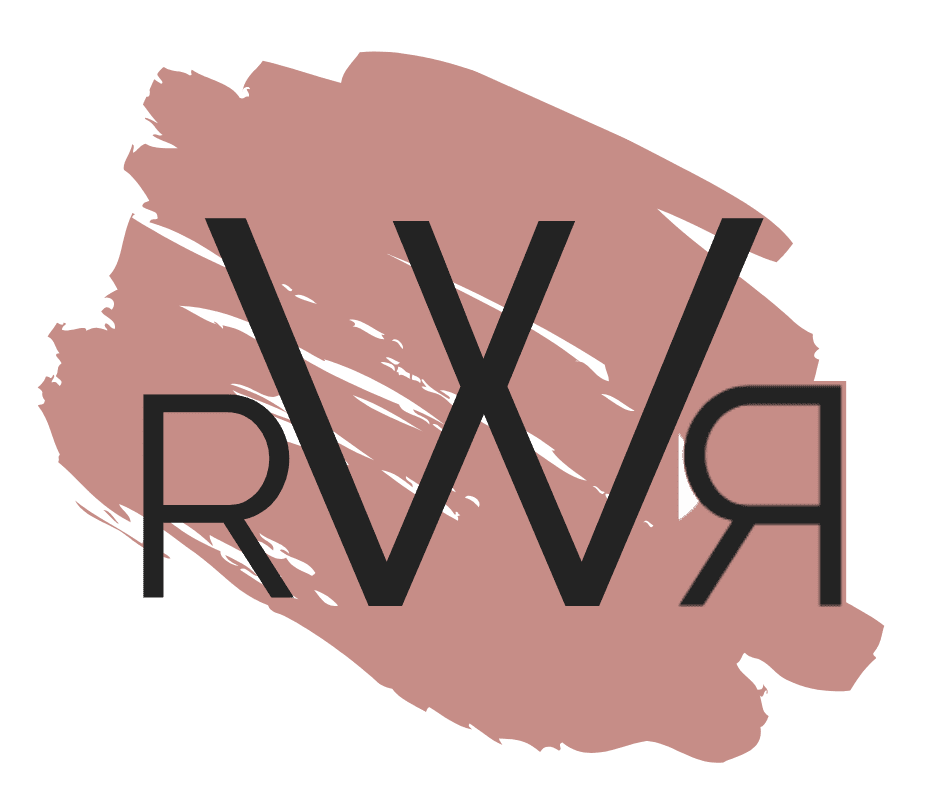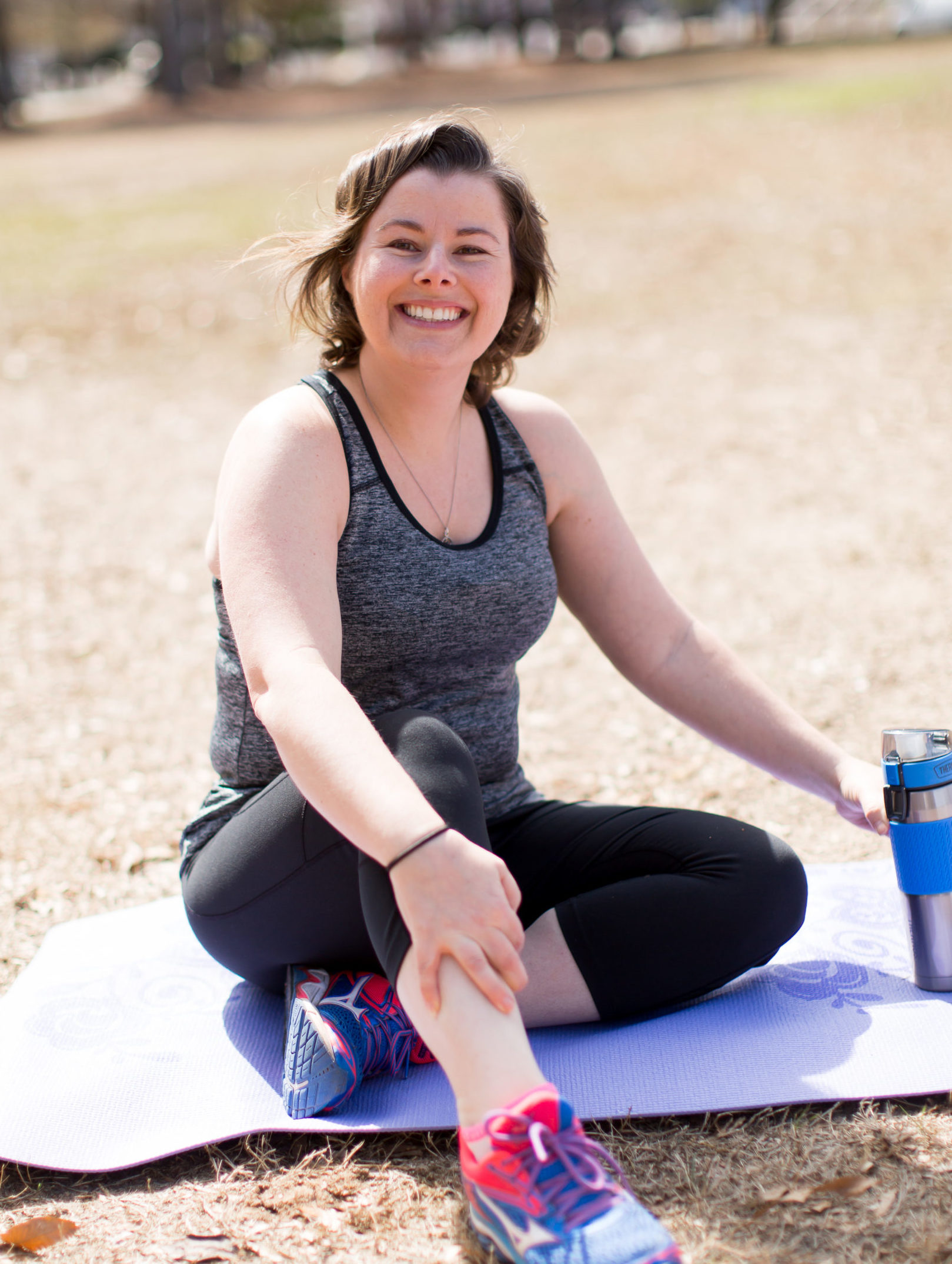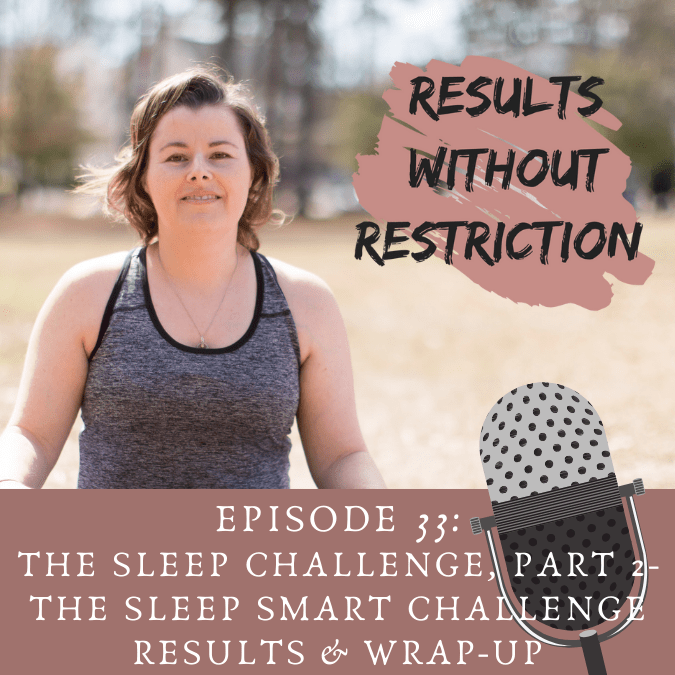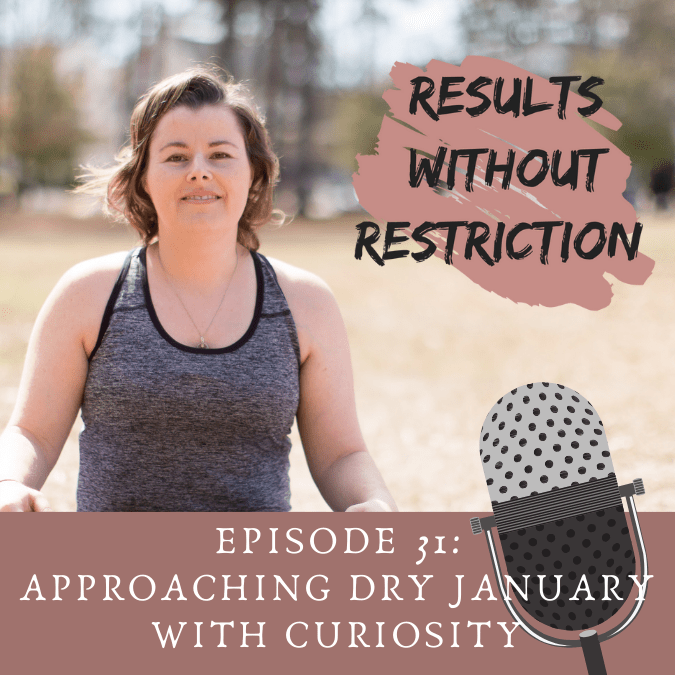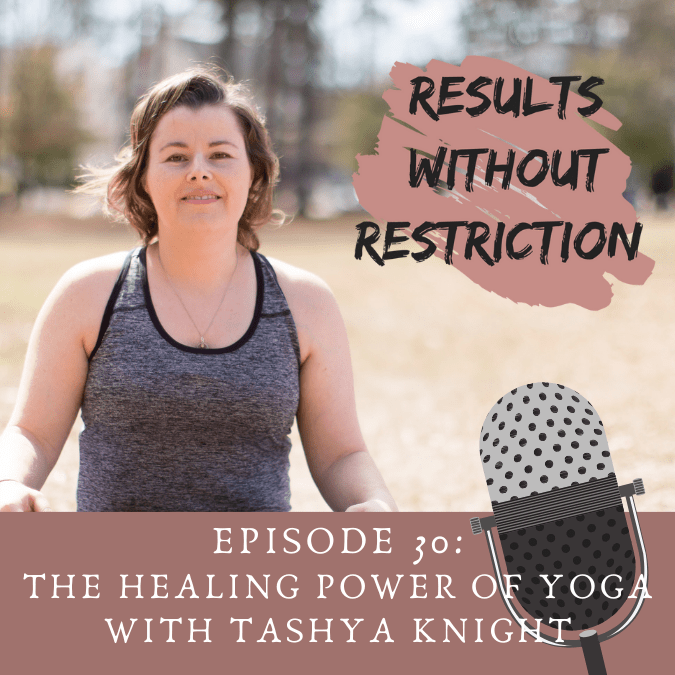Subscribe: Apple Podcasts | RSS
In this episode, I’m letting you listen in on a private sleep strategy session that I did with a sleep coach to prepare for an upcoming 30-day sleep challenge. I was struggling with chronic exhaustion because I had garbage bedtime habits and I needed to do something to turn it around. I decided to embark…
Key Takeaways:
- Consistency is key when it comes to establishing a healthy sleep routine. Going to bed and waking up at the same time every day can help regulate the body’s internal clock and improve sleep quality.
- Creating a relaxing sleep environment is crucial for promoting restful sleep. This includes decluttering the bedroom, using aromatherapy, and minimizing noise disturbances.
- Managing stress throughout the day can significantly impact sleep quality. Incorporating relaxation techniques such as yoga, meditation, and deep breathing exercises can help reduce stress and promote better sleep.
- If you’re unable to fall back asleep after waking up in the middle of the night, get out of bed and engage in a relaxing activity until you’re feeling sleepy again. This can help prevent you from associating the bed with being awake and promote better sleep efficiency.
- Doing a brain dump before bed can help clear the mind and reduce racing thoughts that may interfere with falling asleep. Writing down tasks and concerns can provide a sense of relief and allow for a more restful sleep.
Quotes:
- “If you’re not sleeping, you can’t do anything else. It just trickles down into everything.”
- “I need to be more consistent and more intentional about what I’m doing during the day and in the evening to get better sleep.”
- “Creating a relaxing sleep environment and establishing a consistent sleep routine are key factors in improving sleep quality.”
Resources Mentioned:
About Christine:
Christine Meyer is an Ace Certified Health Coach, Certified Health Education Specialist, and a Licensed Physical Therapist Assistant. She has over 14 years of experience in the health and wellness field and helps mid-life women go from foggy to focused, by helping them restore their restful sleep. Her coaching focuses on lifestyle changes, which includes stress management and time management skills. She is a wife, mom, and new Grandma and resides in Southern California.

Connect with Christine:
-
On Facebook: Facebook.com/Christinesleepcoach
-
On Instagram: @Christinesleepcoach
- Book a consultation: CLICK HERE
- Download Christine’s Free gift: The Sleep Tips Ebook
Episode Transcript:
0:00:00 – I don’t think there are enough people who talk about the importance of sleep. You know, people will do like nutrition or workouts and stuff like that, but it’s like if you’re not sleeping, you can’t do anything else. I mean, it just trickles down into everything.
0:00:13 – (Laurie): I’m Laurie Mallon, and this is the results without Restriction podcast, the show where results have nothing to do with weight and everything to do with setting and reaching health and fitness goals that focus on what we’re achieving and not what we’re doing losing. We’ll talk about deprogramming from diet culture and get expert advice on reclaiming your relationship with food and movement. Join me on this journey to get results without restriction.
Welcome, everyone. Today’s episode is a little bit different. It’s part one of a two part episode where I’m sharing my experience participating in a 30 day sleep challenge that I recently completed with the help of sleep sleep health coach Christine Meyer. Now, you may remember that Christine Meyer was previously a guest on the show. If you listen to that episode, you’ll hear me admit to Christine that my personal sleep habits are not that great. They finally caught up with me a few months ago.
I found myself chronically exhausted, and it was having a negative impact on pretty much every area of my life. So I reconnected with Christine and she agreed to help me with my 30 day sleep challenge. The 30 day challenge started with Christine and I meeting virtually for a better sleep strategy session so that she could understand my current sleep situation and struggles. Then she sent me a restful roadmap, which was a summary of our call and printable action plan for me to use during the 30 days of the challenge.
This episode is a recording of our strategy session. In the next episode, I’ll be recapping my challenge experience and reviewing my results with Christine, so be sure to check out that episode after you listen to this one. So now have a listen in on my virtual sleep strategy session with health coach Christine Meyer.
[Beginning of the Consultation Recording]
0:02:02 – (Christine): Welcome. Basically, what we’re going to do is talk about your sleep habits. You know, what’s going well, what are you struggling with? And at the end of the session, we will decide together four action steps that you can start implementing over the next 30 days to help you with your sleep, and then I’ll be sending you everything we discussed and the goals that you’re going to be working on. Tell me what’s motivated you to seek help with your sleep.
0:02:27 – (Laurie): I’m so tired, christine. I’m tired all the time. I was at the point where I was just so tired all the time, and I was like, oh, my God, I’m dying. Like, something has to be seriously wrong with me because why do I feel like this all the time? And then I got an apple Watch, and I started wearing it to bed, and my watch was like, oh, by the way, you have a double digit sleep jet. And I was like, well, shoot, I had no idea my sleep was. Was that bad. Like, I know sometimes I stay up a little bit late or sometimes I get up too early and it’s like, we have pets and I have a kid and, like, things interrupt my sleep. So I was like, I didn’t realize it was that bad.
So I was like, okay, I need to do something about this. And then we had our podcast, and I was like, I definitely want to do something about this. Did a few things, and I can see when I do these things, it gets better. When I don’t do these things, when I do my own thing, that debt climbs. And I’m like, what I need is a routine, a habit. I need a block of time that I dedicate to establishing really good, like, sleep hygiene or, like, a nighttime habit. Because I’m getting to the point that when that sleep debt is getting high, I’m just useless during the day. I’m just counting the hours until it’s socially acceptable for me to go to bed.
0:03:41 – (Laurie) Like “please let my son go to Bed soon so I can go to bed.”
I need to be more consistent and more intentional about what I’m doing during the day and in the evening to get better sleep.
0:03:53 – (Christine): So when you’re doing the things you need to do, sleep is good. And you notice that when you don’t do the things you need to do, it’s not so good. What keeps you from that consistency of being in a routine?
0:04:04 – (Laurie): When I make the choice to go to bed early and I don’t have my phone at night and I get caught up, my sleep jet gets under 5 hours, I feel great. And I’m like, oh, I can stay up and watch tv with my husband or watch a movie after my son goes to bed or something, and it’s like, I can’t keep doing it because then my sleep debt climbs up, then I’m exhausted, and then we do the whole thing over again. So, yeah.
0:04:27 – (Christine): So you tracking your sleep debt kind of contributes to that pattern. It sounds like looking at the numbers and seeing what you’ve accumulated or if it’s going up or down, would that be right?
0:04:38 – (Laurie): I’ve made the observation that when that sleep debt goes down, how I feel, I feel a certain way. And when I feel that way, like. If I didn’t, if I saw the number and it said like four and I still felt like shit, I wouldn’t stay up. Like, I would be like, “oh, I really want to go to bed.”
But it’s like I’m just having the Awareness of how I feel And when I feel good and I Have a lot of energy, then I start thinking I can stay up and party like I’m 46 again.
0:05:06 – (Christine): So it’s keeping those patterns in place even when you’re feeling good. But a preventive measure in a way, right.
0:05:12 – (Laurie): I want it to kind of just be a routine where I’m not, you know, maybe staying up and watching a movie is a once a week thing or it’s like a Friday night thing, but it’s not like a bunch of nights in a row until I feel like I just am exhausted again.
0:05:26 – (Christine): So there’s an inconsistent sleep schedule. Like you mentioned, you go to bed at eleven, but that sounds like that can vary quite a bit.
0:05:32 – (Laurie): It can vary. When I’m really tired, I’ll go to bed. Before my son even goes to bed, I’ll just say, “peace out, I’m going to bed. I’ll see you guys later.” My husband’s like, “bye, go to bed.” If I’m really tired, I put myself to bed. But then I’m like, two days later, I can be up at 11:30 doing whatever, watching a movie, doing stuff on the Internet, like scrolling facebook.
0:05:52 – (Christine): How does this affect your day to day life? All of the inconsistency and kind of the back and forth with that.
0:05:59 – (Laurie): It affects how I interact with my family. I’m not popular here because it affects my mood and I’m just cranky, snippy. I don’t have the energy for things that I’d like to be doing, which is getting back into running and lifting. The idea of working out when I’m too tired is just, I just can’t because I just want to sit on my couch and just go to bed.
0:06:21 – (Christine): Okay, so the sleep and the moodiness affects others in the, in the household there?
0:06:26 – (Laurie): Yes.
0:06:26 – (Christine): All right. And how long have you been experiencing this?
0:06:30 – (Laurie): Probably like, since COVID hit as a parent, I already had like, a certain level of, like, low grade chronic stress. But then with COVID and then, like, things going on in the world, like, it just kind of got worse and I found myself waking up a lot at night. So even if I went to bed early, I was still waking up randomly and 2 hours later I can’t get back to sleep. So it probably started around three years ago where it got bad. But if I’m honest, my sleep hasn’t been great basically since I had my son nine years ago. I just kind of accepted that’s, that’s where we are, so.
0:07:02 – (Christine): Okay, so I did review the questionnaire, obviously, so I’ve got a lot of that information from you. We’re going to, you know, dive in deeper into, into some of those areas, but definitely want to call out, you know, things that you’re doing that are helpful for sleep and. Sounds like you exercise on a pretty regular basis, would you say?
0:07:20 – (Laurie): Yeah, I walk the dog twice a day for half an hour whether I want to, and I’m like a zombie or not. That’s like the bare minimum. Sometimes I do other stuff, but it depends on my energy level.
0:07:30 – (Christine): Okay. But it sounds like you want to do more. And like you said with the like weight training,
0:07:35 – (Laurie): I want to get back into running now that it’s cooling off, but I’m just like.
0:07:38 – (Christine): Okay, alcohol sounds very infrequent. You said maybe once a week, if that I can be a sleep sabotager. Uh, for sure. Especially in the evening time. Sounds like you’re limiting caffeine to early afternoon. Or would you say on the days you’re tired you are drinking it later in the day?
0:07:55 – (Laurie) I try not to really just try to pay more attention. I used to have two cups of coffee early. Between like seven and ten would be like I’d have my coffee done and then I would have a soda between like around lunchtime. And then I would try to just do water or other drinks, non caffeinated or tea or something in the afternoon. But on the days that I was really tired, I would make the mistake of like, I’m like, hey, I really need to like pep up here a little bit, have a later cup of coffee again. That keeps me up later, and then we kind of start the cycle all over, so.
0:08:30 – (Christine): Right, gotcha.
0:08:31 -(Laurie): But for the most part, I try to keep it well before, like the after, like mid afternoon, so.
0:08:38 – (Christine): Okay. It doesn’t sound like you’re eating late at night. You said your last meal is about 6630 and it sounds like you’ve got some outlets for first stress management. Aside from the exercise you’d like to read, I think you said you connect with your friends. You did rate your stress at about a seven out of a ten. You said you manage it fair? Tell me more about that.
0:09:02 – (Laurie): I’m just always in a probably that, like, low grade level of I’m always thinking about stuff. It’s hard to shut my brain off. So I think that is kind of like what I’m referring to. Like that I’m always trying to remember stuff. Did I forget this? I also have ADHD, so that’s like my default. Always trying to keep track of the sticky notes in my mind. Constantly running through that loop of what did I forget? What do I need to remember?
0:09:27 – (Christine): When you say manage it fair, I.
0:09:30 – (Laurie): Feel like I could do a better job of actively trying to relax, like doing a little bit more to turn it off. I don’t really try to turn it off. I just wait till it. It wears down.
0:09:43 – (Christine): Right.
0:09:44 – (Laurie): And I just kind of don’t know. But if I was like, you know what? I’m going to shut the door on this. I’m going to focus on this. That’s not work related. It’s not news, it’s not. It’s not stressful. It’s like fun. It’s like some kind of activity or game or whatever. That’s just for the purpose of relaxing, reading my book or something like that. So getting better at that intentional flipping of the switch of my brain is now in this mode.
0:10:11 – (Christine): Right. There’s that difference between, you know, doing things to manage stress, but like you said, also just unplugging and doing things that are not stimulating the brain as much and slowing down there. So. Okay, so it sounds like you wake up in the middle of the night at least one or two times a week.
0:10:31 – (Laurie): Yeah, probably. Well, so I’m not great about drinking water. It’s one of my things I want to be better about, but I’m not great about remembering to do it during the day. So I’ll like, get to be like, 04:00, 05:00 and I’m like, oh, I need to drink my water. And then I’ll start drinking water. And I try to stop before 08:00 but I feel like I’ll wake up at least once to pee during the night.
0:10:54 – (Christine): And so how often does that happen?
0:10:56 – (Laurie): Probably almost every night. I also have pets. I have a dog who sleeps on my bed. That probably wakes me up because she hears the cats. They can’t be together as a dog will eat the cat. So she hears the cat, she wakes up, she Wakes me up. So sometimes that’s what wakes me up, too.
0:11:17 – (Christine): Gotcha. And your husband snores as well, is that right?
0:11:19 – (Laurie): He does.
0:11:22 – (Christine): All right. So we’ve got some noise there. How long does it take you to get back to sleep when you’re awake In the middle of the night?
0:11:27 – (Laurie): Sometimes it’s easy, and then other times I’ll lay there for, like, an hour and a half.
0:11:32 – (Christine): Okay. And what do you do to try to lull yourself back to sleep?
0:11:36 – (Laurie): Sometimes I count backwards from 100. Sometimes I just try to remember things that I’ve memorized in the past, just to not think about the things that I know are going to hype me up. So I try not to think about, like, work stuff or the state of the world or things like that. I’m just, like. I try to go to, like, boring routine, like ABCD, like, just things that are going to kind of bore me.
0:12:03 – (Christine): So it sounds like you’re from what I read in the questionnaire, your sleep can vary anywhere. You’re in bed maybe about seven and a half hours, but you’re sleeping maybe six to seven. What’s different on the nights that you’re getting less asleep?
0:12:15 – (Laurie): I fall asleep pretty easily. So if I’m not getting sleep, it’s either because I went to bed too late, I stayed up because I waited too long, and then I didn’t feel tired, or I’m waking up in the middle of the night, and then I can’t get back to sleep. Those are my two big things. But once I lay down, like, and I turn off the light and take off my glasses, I fall asleep pretty quickly. I don’t ever lay there going, oh, hey, I can’t sleep. But it’s just when I wake up a few hours later and I go pee and I’m like, oh, I’m awake.
0:12:46 – (Christine): Okay. And you read in bed before you go to sleep? Table lamp or overhead lights?
0:12:52 – (Laurie): It’s just a little table lamp.
0:12:53 – (Christine): Okay. In the evening time, you tend to have the lights on in the house?
0:12:58 – (Laurie): Yeah.
0:12:59 – (Christine): All right. And you wear, like, any blue light glasses at all when you’re reading?
0:13:03 – (Laurie): No.
0:13:04 – (Christine): Okay. And you have regular, like, led light bulbs in your. Your lamps?
0:13:10 – (Laurie): I assume so.
0:13:11 – (Christine): Okay. All right. So what’s worked well in the past, you said, is reading. And what else? When you get in a good routine, what’s. What’s that look like for you?
0:13:22 – (Laurie): Tea in the evening, like after dinner? Yoga. Nidra read my book, and then, you know, lights out. So that’s usually, like, a good. For me. That’s been helpful.
0:13:35 – (Christine): Okay. And what would it take for you to get back to that and stay consistent with it?
0:13:42 – (Laurie): I would have to set a boundary and say, this is the time I’m going to do this. This is what I’m going to be doing. You guys like people in my house. You do whatever you want. Don’t involve me. I’m busy. I’m going to be doing this. I’m doing my yoga, I’m going to read my book, and I’m going to bed, so.
0:13:58 – (Christine): Okay. And then you said you’ll still make space for, you know, having an occasional late night for the tv.
0:14:04 – (Laurie): Yeah. So, like, once a week on a weekend, I don’t have to get up early the next day for school or for work out. I can sleep in a little bit.
0:14:12 – (Christine): So, based on what we’ve discussed so far, like, what really stands out for you? Is there anything that kind of jumps out at you, aside from the routine? Anything that we discuss that you feel needs to be part of your action plan?
0:14:26 – (Laurie): My room could probably be a little bit more relaxing, a place I want to go. And it’s easy for me to relax. Like, there isn’t a pile of clothes in the corner. There’s a bunch of donation stuff sitting on top of my dresser, and, like, making that space relaxing.
0:14:44 – (Christine): All right, so room environment, routine. Anything else?
0:14:47 – (Laurie): I think I would like some, like, aromatherapy, something next to my bed that smells nice because I mentioned I have a dog. So sometimes I go in there and I’m like, hmm, kind of smells like dog in here. Doesn’t bother me, but I’m like, it could be better.
0:15:01 – (Christine): And that kind of goes in with the environment of the room. And your nighttime routine with would get, you know, could be infusing that. So anything else I think, too, what.
0:15:13 – (Laurie): Would also help me is kind of a brain dump before bed. Like, I want to make sure I do this tomorrow, or here’s what’s happening tomorrow. I know I need to do this, this and this, but just someplace where I can just kind of get it out and then it’s safe. I’m not relying on myself to remember it because.
0:15:33 – (Christine): Right. That’s what kind of stands out for me with a lot of, this is, like you said, stress management, having those relaxation moments where you’re just unplugging and not doing and even, you know, not even just in the evening time before bed, but maybe even taking some kind of a timeout during the day. A lot of times we’re go, go, go, go all day, and it’s like, okay, it’s time to relax at night. And it. It doesn’t always work that well because we’re kind of wound up. We’re in that mode.
0:16:02 – (Christine): So how do you feel about doing something during the day to, even if it’s just a very brief moment, to just kind of step back and do some kind of unplugging relaxation type of activity or exercise? You mentioned yoga, nidra, and actually, those can be very beneficial. Midday as well, because it helps you to kind of, you’re unplugging, relaxing, but at the same time being aware. And so that could be something again, you know, looking at things that are more unplugging, where you were just calming your body and your mind and just being, like, calm in that moment.
0:16:43 – (Christine): Yoga, nidra, a meditation, deep breathing. Just something where you’re just basically your mind and your body, you’re being still, if that makes sense.
0:16:52 – (Laurie): Okay. Yeah. I could do ten to 15 minutes restorative yoga in the afternoon, 15 minutes before I go to get them from school. I can just shut the computer off a little bit early and do that.
0:17:04 – (Christine): Yeah. Yeah. And again, it doesn’t have to be anything really long. You could be sitting in your chair doing, you know, neck stretches, time of thing, but just anything to just kind of be in that decompressing moment. Because if you think about everything we do from the moment we wake up, it’s going to. It’s going to go with us to bed at night. Learning to just decompress during the day as well so we’re not carrying it all into the evening time can really be helpful.
0:17:29 – (Christine): Taking those self care moments.
0:17:31 – (Laurie): Okay. I like that sometimes it’s just taking.
0:17:34 – (Christine): A few deep breaths, just closing your eyes and stopping what you’re doing when you notice you’re getting wound up. I call it a mental timeout.
0:17:40 – (Laurie): So I never get wound up. Christine. I’m holding my hand.
0:17:45 – (Christine): Some relaxation during the day, making the environment more relaxing, having that routine. And this is all going to help with your stress management and. Right. It’s all wound up together there. The other thing that stands out for me is, you know, not getting. Being able to go back to sleep at night. It’s fragmented. What do you feel about doing something like a breathing exercise, a body scan some way, again, to not keep the brain active. What a lot of people do is they’re thinking, I need to get back to sleep. And then your brain is still thinking, you know, and it’s more stressful. So maybe, again, doing some kind of relaxing activity.
0:18:27 – (Christine): It’s actually recommended. If you can’t get back to sleep after 20 minutes, you should get out of bed, go into another room where it’s quiet. And again, you could do those activities. It could maybe be reading under low light, but doing some kind of breathing, listening to relaxing music until you get sleepy again, and then go back to bed. Because what can happen is we start associating the bed with not sleeping. If we’re laying there tossing and turning so many times, you know, it can kind of start affecting you, you know, mentally, that you’re worried about not getting back to sleep. So basically, about 85% of the time that you’re in bed, you should be sleeping.
0:19:03 – (Christine): And when I looked at your, your numbers, you know, it kind of varied from like six to 7 hours. But sometimes your sleep efficiency is, you know, basically anywhere from 80% to 90%. I don’t like hyper focusing on numbers, but that’s just to kind of give you a, an understanding of what that is. So you’re in bed seven and a half hours, but maybe only sleeping six to seven and a half. And so it may seem counterproductive to get out of bed when you can’t sleep, but it actually can help with you, you know, sleeping more while you’re.
0:19:31 – (Laurie): Actually in the bed. You know, if not getting out of.
0:19:34 – (Christine): The bed is not an option for you, you could just focus more on relaxation type of activities.
0:19:40 – (Laurie): Can I get out of the bed? But like, go sit in a chair in the same room and like a meditation or something over there. You can try that.
0:19:47 – (Christine): Another option too, like I said, is, you know, do just kind of, if you’re going to stay in bed, is focus on just doing those relaxing type of activities. Just focus on relaxing versus focusing on trying to sleep. That would be my suggestion for that. And then with the noise, obviously we can’t change some of the environment around us. I don’t know if you’ve tried earplugs or anything like that to help you sleep at night.
0:20:10 – (Laurie): We have a sound machine that we run in the room. Seems to be helping. I find it comforting if I wake up and I hear my husband snoring, that can kind of keep me awake. But what I do then is I pretend it’s the dog snoring and then it doesn’t bother me. I had pugs for twelve years, so I always found that, like, it was very. A comforting sound to me. The other thing I meant to tell you is I have a weighted blanket and I have one of those weighted eye masks that I like to sleep, like, with on my head.
0:20:36 – (Christine): Okay, whatever works for you. So your top four tips would be to create that environment in your room with aromatherapy. And you said cleaning up clutter.
0:20:49 – (Laurie): Yes, it’s cluttered.
0:20:50 – (Christine): Okay. How else could it become more sleep conducive for you?
0:20:54 – (Laurie): I don’t think there’s really much else other than making it smell better and just knowing it’s cleaned up and tidy.
0:21:01 – (Christine): It’s true. I mean, there’s actually research to show that having a cluttered room can actually contribute to stress and sleep. Just, it’s a subconscious thing, but it’s, it’s a real thing. So that sounds like that’ll be very helpful for you. So sticking with your routine of the reading, the quiet time, yoga, nidra. Now, routine includes like a sleep schedule. You know what would be an ideal one for you? Not that it has to be rigid and set in stone seven days a week, but I. Ideally, what time should you be going to bed and then waking up?
0:21:35 -(Laurie): Ideally, I’d like to be trying to at least sleep seven and a half to 8 hours. We get up at 630. So if I’m asleep by 10:30 with no interruptions, ideal. However, I’m going to have at least one interruption during the night. So I kind of want to give myself, like, padding. So if I could be starting my routine by 9:15 and then in bed, turning off the light at 10:00 I think would give me that buffer, like that time to unwind and then falling asleep early enough that if I do have some kind of interruption, it’s not gonna throw me off my schedule too much.
0:22:13 – (Christine): Okay. And are you always waking up at the same time?
0:22:16 – (Laurie): Yes, except on weekends, not as much, but during the week, that’s our standard. Everybody gets up at 6:30.
0:22:23 – (Christine): Okay, so 9:15, start the wind down routine. Be in bed by ten. How confident do you feel that you can do that on a scale of one to 10, being most confident, I.
0:22:34 – (Laurie): Give it a nine. It’s a matter of just prioritizing it and making it, establishing the habits.
0:22:42 – (Christine): Okay. And then it sounds like the brain dump will be part of the nighttime routine then.
0:22:48 – (Laurie): Yes.
0:22:48 – (Christine): And you may, just might need to experiment with it. And it’s, it may change. You may find, well, I don’t like doing it this at this time. And nothing has to be really rigid, but it’s knowing that we have kind of like that menu options of things to do. And you just know this is your time for you to wind down. What do I feel like doing tonight type of a thing? It’s perfectly fine. Sounds like the brain dumps going to be definitely part of that for you. So you can, you know, keep the brain from thinking too much. You know, even if you wake up in the middle of the night, it can definitely help with that. And then during the day, finding some time for some kind of relaxation would be the third one. Right.
0:23:25 – (Christine): And then we’ve got if waking up in the middle of the night, maybe going and sitting in a chair, if you can’t get back to sleep after 20 minutes, you said maybe do a meditation. What do you think you might do during that time?
0:23:37 – (Laurie): I think. I think a meditation might be good. And then trying to go back to sleep.
0:23:42 – (Christine): Okay, so how does that sound to you?
0:23:45 – (Laurie): That sounds good. That sounds doable. It sounds like really simple, like things that I can implement. Right. Nothing or nothing here is like heavy lifting.
0:23:56 – (Christine): And it sounds like you’ve got good support from your husband. If you tell him he can help hold you accountable, you can feel not guilty about it. He’ll reap the benefits.
0:24:06 – (Laurie): That’s going to be his biggest motivation, that I’ll just be overall in a better mood and more agreeable.
0:24:12 – (Christine): So what I’m going to be sending you is a summary of the four suggestions here and the tips as far as you know what you can do. And then there will also be like a resource page for some apps for meditation and breathing, some of my YouTube breathing videos. Another one’s a website for managing stress. But is there anything else that you feel would be helpful?
0:24:36 – (Laurie): I think that would be good. What I’m afraid of is overloading going too much in the opposite of like now. You know, I have a few things to do, but I’m so anxious to solve this problem. I’m going to try to do too many things. So I kind of want to keep it the handful of things I’m going to do.
0:24:50 – (Christine): As far as the session today, how was that for you?
0:24:53 – (Laurie): Very good. It really helped to kind of verbalize and reinforce, you know, why it is that I want to do this.
0:25:00 – (Christine): Okay, good. I will give you our summary and everything.
0:25:04 – (Laurie): This is great.
0:25:04 – (Christine): Thank you, Christine.
0:25:05 – (Laurie): Okay, you’re welcome. See you later.
0:25:10 – (Laurie): Thanks for listening. And if you liked this episode, go ahead and leave us a review on iTunes or wherever you listen to podcasts and be sure to subscribe so you’ll be notified when the next episode is live. Check out our show notes for this episode where you can find any of the links and resources that were mentioned during the show and connect with a health and wellness provider committed to helping you ditch diets and achieve results without restriction.
